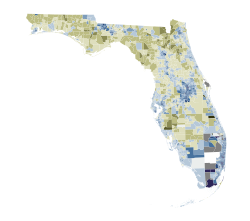| ||||||||||||||||||||||
Increases the state minimum wage to $15 by 2026 | ||||||||||||||||||||||
| Results | ||||||||||||||||||||||
|---|---|---|---|---|---|---|---|---|---|---|---|---|---|---|---|---|---|---|---|---|---|---|
| ||||||||||||||||||||||
| ||||||||||||||||||||||
| Sources: Florida Department of State, [1] New York Times [2] | ||||||||||||||||||||||
| Elections in Florida |
|---|
 |
2020 Florida Amendment 2 was an amendment to the Constitution of Florida that passed on November 3, 2020, via a statewide referendum concurrent with other elections. The amendment sets to increase the state's hourly minimum wage to $15 by 2026. According to Florida law, amendments to the state constitution requires 60% of the popular vote to pass. [3]

